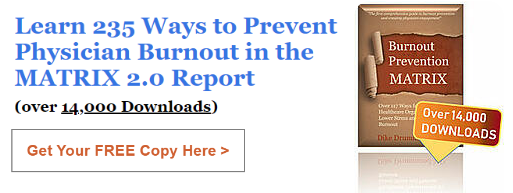 Stop Physician Burnout - New research shows money can by happiness if you spend like this ...
Stop Physician Burnout - New research shows money can by happiness if you spend like this ...
A trio of new studies released this month give us research evidence to answer the age old question, "Can money buy happiness?"
They give us a glimpse into a fundamental relationship between TIME - MONEY and HAPPINESS we can use to our advantage to prevent physician burnout, because ...
Every study came to the same conclusion
-----
-----
Within each study, the answer was "Yes" -- money can indeed buy happiness IF you spend it towards a very specific end.
Money can purchase happiness
-- when you use it to buy back time you would otherwise spend catching up on routine chores.
Buying happiness with cash is not about posessions - diamonds, fancy cars, vacations, clothes, plastic surgery or even or eating out in classy restaurants. This is where we get a glimpse at the relationship between TIME - MONEY and HAPPINESS.
MONEY can make you HAPPY when you use it to BUY BACK TIME. Trade financial wealth for a few of the grains of sand in the hourglass that is your life.
The obvious question is this: Will it work for you?
============
NOTE:
In our 2000 hours of physician coaching we noticed this specific connection between money and happiness a long time ago. It is based on an observation that even the busiest doctor can still find time to have a life IF they have a big enough team. Here is our saying on the subject.
We use a pair of phrases to demonstrate this fundamental connection.
If you don't have enough TIME
you need a bigger TEAM
We also call it, "Delegate the Punch List".
When you spend a little money, to buy back your time and energy on tasks that don't require your level of training and expertise ... you have just flipped the latch on Einstein's Insanity Trap ... and boy does that feel good.
============
Let's look at the research first and then I will show you a way to put this buy-back-your-time technique to the test in your own life -- this week.
REFERENCES:
Here is the article I am quoting.
Here is the original research paper at the Proceedings of the National Academy of Sciences
STUDY #1:
"Professor Ashley Whillans is an assistant professor at the Harvard Business School with a PhD in Social Psychology. She and her team surveyed 4,500 people from the United States, Canada, Denmark and the Netherlands. Survey-takers were asked whether they paid other people to do “unenjoyable daily tasks” in order to “increase their free time.”
28% answered "Yes".
On average, the folks who paid others to do their chores spend around $150/month.
What was their Return on Investment?
-
- The people who traded money for time were more satisfied with life than their counterparts who didn’t.
- They also were less likely to say they felt “time stress”.
STUDY #2:
Just in case their original question was too narrow, the researchers conducted a second survey that asked more than 1,800 Americans whether they spent money to buy themselves “more free time.”
This time, half of the survey-takers answered yes. These folks spent between $80 and $99 per month, on average, so that others would handle chores like cooking, shopping and “household maintenance.”
As before, the people who bought themselves time were more satisfied with life than those who didn’t. And as before, the people who didn’t employ this strategy were generally less satisfied with life because their lack of free time was stressing them out.
STUDY #3:
Finally, Whillans and her colleagues conducted a more direct prospective test.
For two consecutive weekends, the researchers gave a group of 60 volunteers in Vancouver BC $40 to spend.
-
- In one of the weeks, the volunteers were asked to spend the money on a material purchase.
- In the other week, they were asked to invest their windfall on something that would save them time.
The researchers checked in with the volunteers each weekend to see how they felt after they had spent the money.
As expected, the volunteers reported less time-related stress in the week when they made a time-saving purchase than in the week when they bought a material good.
They also had more positive feelings (and fewer negative feelings in the week when they bought themselves time.
So ... 3 Studies produced the same findings. Buying back time made people happy.
For physicians as a group, time is often the limiting factor in your quality of life.
If you think in terms of a shortage, we are collectively more short on time than money. These studies show time and money and happiness are interrelated. They give us a potential pathway to exchange a relatively small amount of money for a small amount of time to generate a significant increase in happiness.
Empirically you know this is true ... right?
When was the last time you spent the few short hours you have off ... on a list of menial tasks that piled up while you were seeing patients or charting?
The hours that were supposed to grace you with some well-deserved down time or recharge turned in to:
- Catching up on laundry
- Balancing the checkbook
- Mowing the lawn
- Painting that dingy old back bedroom
and I could go on and on.
How did that feel?
Realize these are all tasks that could be outsourced easily for way less than $20/hour freeing you up to take a walk, a nap, maybe even read a book for pleasure or get to spend some quality time with your children.
It is quite simple to put this physician burnout preventing magic to work. Check this technique out for yourself.
Check it Out For Yourself
- 7 steps to buy back some of your own time (and see how it feels)

-
-
- Make a list of the chores that pile up while you are at work ... only to waste your time in your off hours. First, just make the list.
- When you are ready to take action - pick one chore off the list and circle it.
- Find someone else you can pay to do it.
- Tell them just exactly how you need the job done - you must delegate well or they can't fulfill your expectations.
- Pay them (while you are off doing something way more pleasurable).
- Do a happy dance.
- Notice how it feels.
- REPEAT or don't ... you decide.
-
BTW, the most common obstruction to this process of buying back your time is ... YOU :-(
Here are the big two stumbling blocks:a) You micromanage the person you are delegating to, spending the whole time hovering over their shoulder to make sure they do it right. That is a major bummer since you spent money and didn't save a lick of time.
b) You are incapacitated by guilt. You feel so guilty paying someone to do a task you "should" be able to do yourself, you fret the whole time they are working for you, apologize profusely and the delegation habit never sticks.
What is the chore you want to delegate the most?
DO IT THIS WEEK and see how it feels.
=============
Here is a summary of Dr. Whillans conclusions after her triad of studies.
"Across several distinct samples, including adults from Canada, the United States, Denmark, The Netherlands ... buying time was linked to greater life satisfaction. These results held, controlling for a wide range of demographics, as well as for the amount that respondents spent on groceries and material and experiential purchases each month. These results were not moderated by income, suggesting that people from various socioeconomic backgrounds benefit from making time-saving purchases. Furthermore ... making a time-saving purchase caused improvements in daily mood.
Why does buying time promote happiness? Our experiment provides the clearest window into this process, by demonstrating that people felt less end-of-day time pressure when they purchased time-saving services, which explained their improved mood that day."
=============
PLEASE LEAVE A COMMENT:
What is your favorite way to use money to buy happiness?


![CLICK HERE to Download the Disruptive Physician's Toolkit [ 10 Specific Ways to Avoid the "Disruptive" Label ]](https://hubspot-no-cache-na2-prod.s3.amazonaws.com/cta/default/263814/69d11978-7715-43fc-b342-9991613931c1.png)
